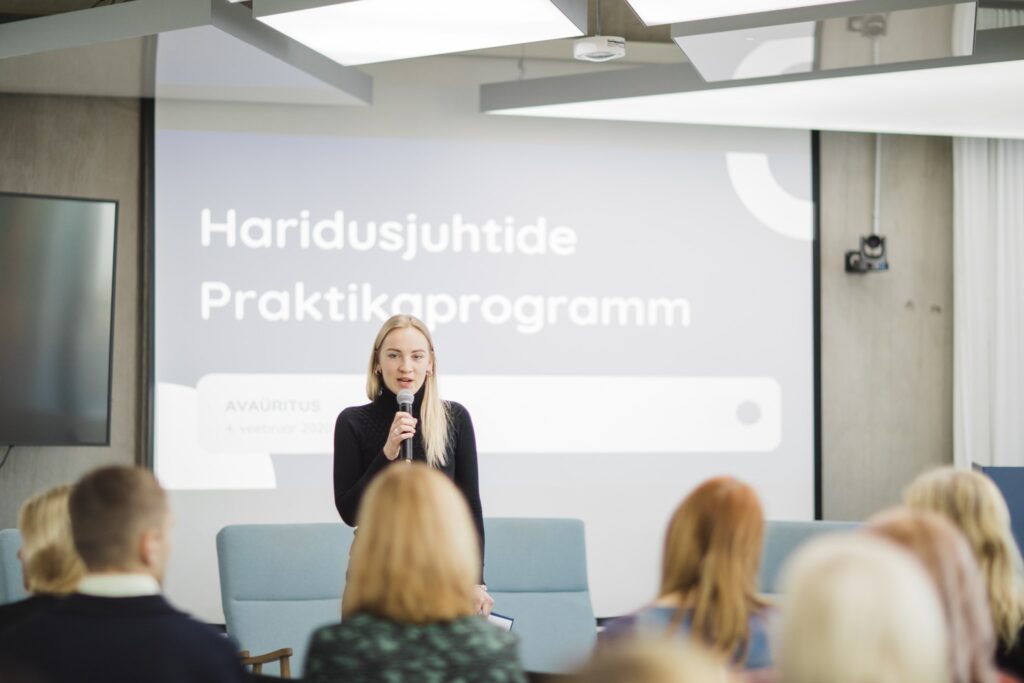Estonian education leaders are bringing good management practices from the private sector into schools through an internship programme set up by the Good Deed Education Fund, the Tallinn Education Board and Fontes Talent Advisory, broadening the world view of both companies and school leaders.
This article is published in collaboration with Education Estonia.
The HK Unicorn Squad movement introduces girls to technology, robotics and science. The ultimate goal is to reduce the gap between men and women working in the ICT sector. There are currently 154 groups of little Unicorn girls in 92 schools across Estonia.
Edumus is a platform that brings together schools and professionals. There are 80 schools in every corner of Estonia that have joined the platform so that their students in grades 10-12 can choose the most valuable online courses for them.
Bringing together different sectors and creating equal opportunities is one of the key values of both the Good Deed Education Fund and the Good Deed Foundation, but to see the whole picture, it is important to take a few steps back to the year 2018.
This is the year that the Good Deed Education Fund was launched by the Good Deed Foundation (founded by entrepreneurs Artur Taevere and Hannes Tamjärv in 2003), Martin Villig and Taavet Hinrikus, the co-founders of Bolt and Wise, respectively, together with the new generation of entrepreneurs who have so far contributed €3 million to the fund.
Private sector management culture brings fresh ideas to schools
Martin Villig, the chairman of the Good Deed Foundation, said he was contributing to the education system because he was still an idealist and believed that every child should get a good education, as this is the basis for a smarter, healthier and more balanced society and reduces government spending on healthcare, social services and law enforcement.
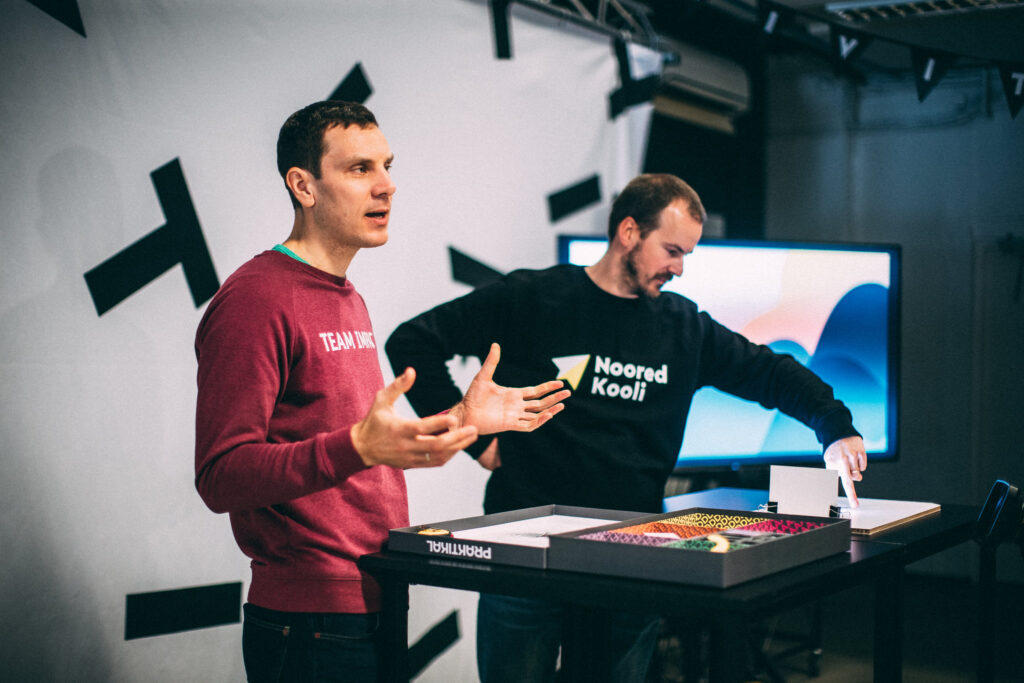
The Good Deed Education Fund aims to solve acute problems in the education sector: the quality of school management, addressing the shortage of teachers and learning how to learn. The fund is looking for initiatives that address these issues in a measurable way to improve the quality of education in collaboration with leaders from different sectors – public, private and non-profit.
The school leadership internship programme mentioned above is a great example of cross-sector collaboration. It was initiated by the Good Deed Education Fund in 2019, but the idea came from the then head of the Tallinn Education Department, Andres Pajula, and at the same time the board member and head of the development team of Fontes Talent Advisory, Piret Jamnes.
Pirkko Valge, the CEO of the Good Deed Foundation and one of the initiators of the internship programme, said Pajula’s and Jamnes’ ideas came together at the Good Deed Education Fund and were developed into a comprehensive programme.
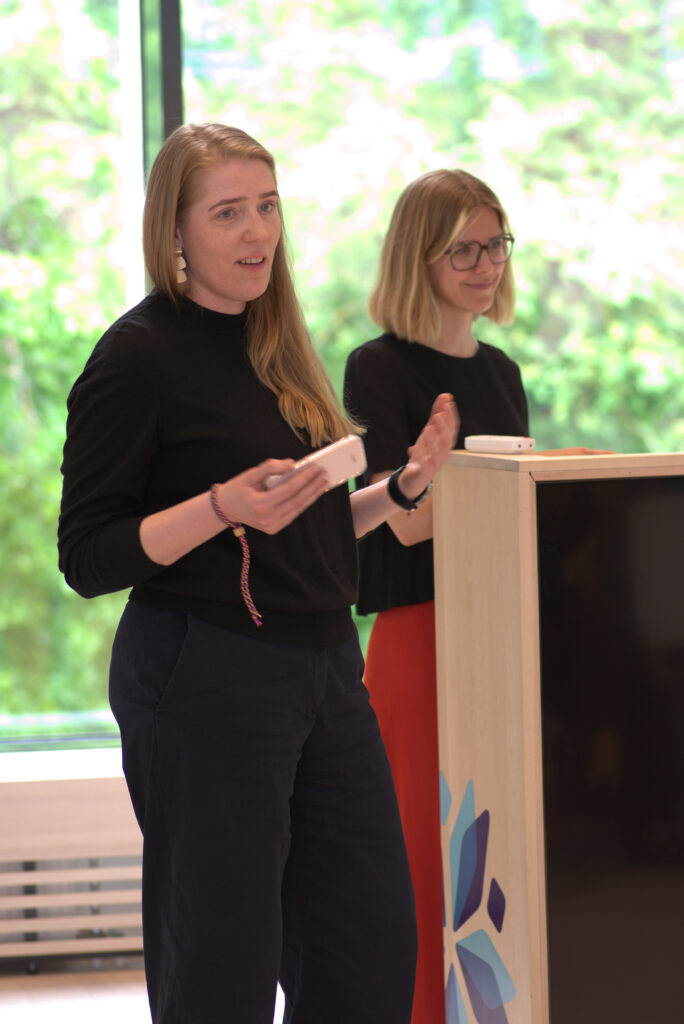
Thanks to the active participation of the Tallinn Education Department, the capital’s school principals were the first five brave souls to test the programme. “This experience gave us the confidence to continue and develop the programme even further,” said Valge. In January 2024, the fifth group of school leaders started their internships.
The public sector plays an important role
Pirkko Valge emphasised that schools had yet to adopt the best leadership and management practices.
“If in the private sector there is strong competition for talent and the development of strong leadership is part of the solution, in schools in general leadership has not yet been the main focus. For years, the focus has been solely on students and their learning, and we like to proclaim that teachers are autonomous,” she noted.
“Unfortunately, this is often accompanied by a lack of support and we see both new and experienced teachers leaving the school. A lot of what the headteachers have learnt from the programme is that they need to focus more on their own teams to support the pupils, and the work experience programme has been crucial in helping them to do that,” said Valge, explaining why they decided to bring the two parties together.
So far, the largest towns, some smaller municipalities and schools under the auspices of the Estonian education and research ministry have joined the programme, but the fund is constantly working to spread the word and encourage more local authorities to get involved.
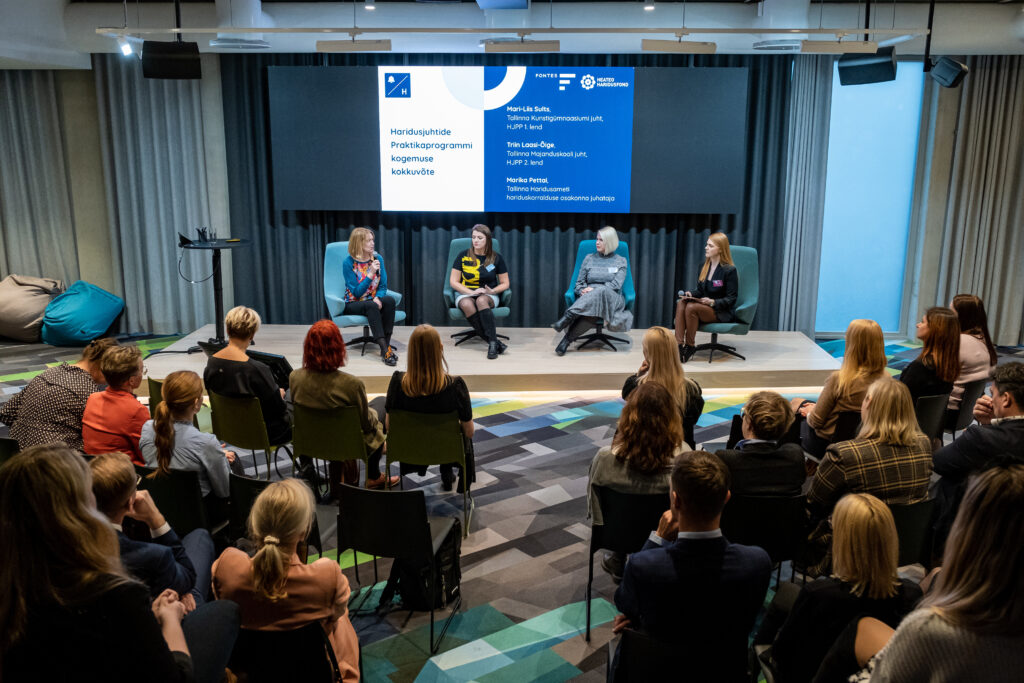
School administrators, both from the education ministry and from local authorities, play an important role in the programme. Valge explained that the role consists of evaluating and deciding who to encourage to apply, helping to organise the substitutions and paying for the headteachers’ participation. “The support for the organisation of the substitutions has been very different – some have paid the salary for the substitutes, some have taken on some tasks themselves,” Valge pointed out.
Changes in communication
The principal of Tartu Jaan Poska High School, Mari Roostik, participated in the programme last year. “This was my third year as a headteacher and there is a lot to learn from other headteachers, but in order not to be buried under the way things have always been done, I wanted to learn from an organisation that could serve as a kind of role model for a school.”
Roostik interned at Veriff, an Estonian digital verification technology company. “This company has employees all over the world, everything runs smoothly across three to four different time zones. When the system is in place, everything gets done,” she explained.
For her, one of the key questions was how to create a leadership system that would support all teachers, and therefore all students. “I wanted to learn how to be a better leader and I definitely gained that knowledge,” she said.
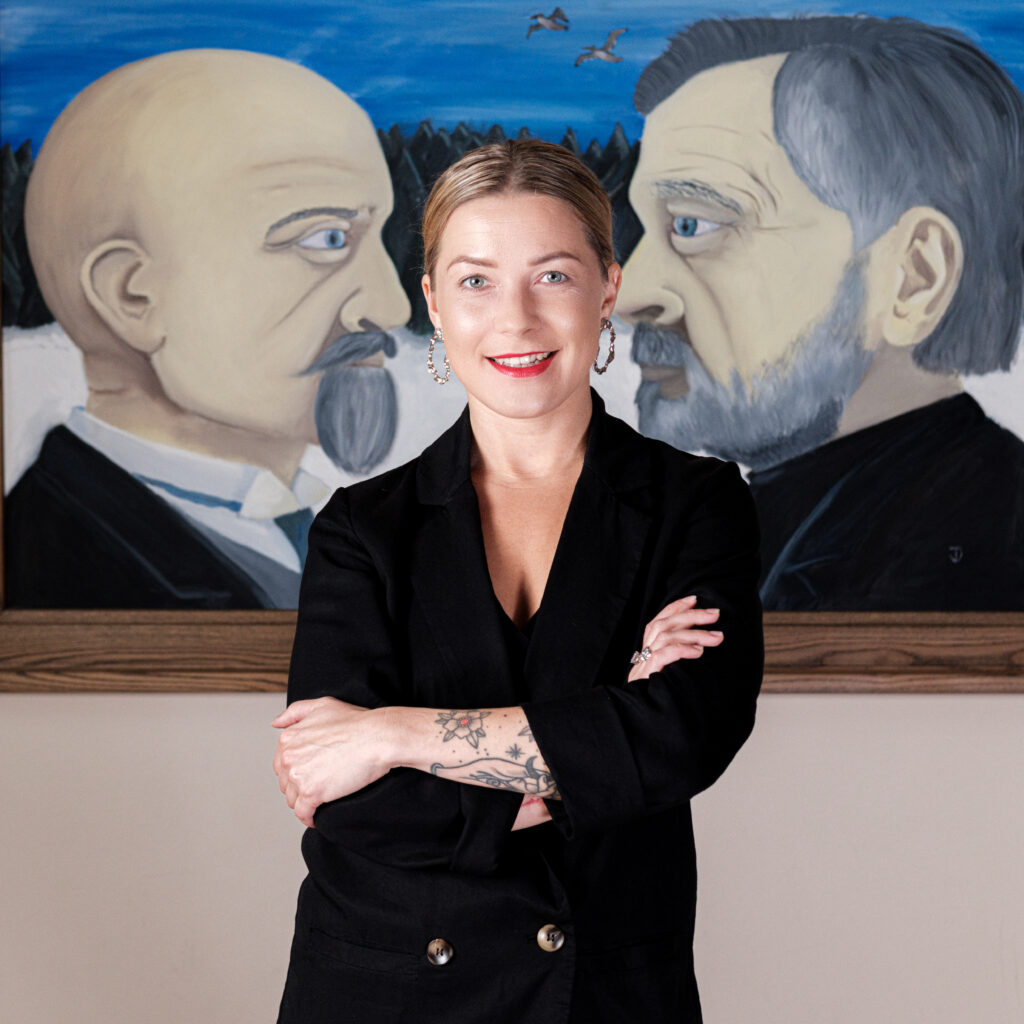
Mari-Liis Sults, the headteacher of Tallinn Art Gymnasium, took part in the 2020 pilot programme. “The school is a big organisation, somehow society doesn’t realise that yet,” she said, explaining that there is still a strong belief that a principal should know and do everything in the school.
“That’s impossible – the principal can’t look for every lost shoe in the wardrobe – because leadership suffers. My job is to create a system where the teachers are less stressed and to keep that system running so that the students are happier,” Sults said.
Sults spent three months working in different departments of the Estonian-founded money transfer company Wise (then TransferWise). “My plan was to actually work, not just look around, and I had the chance to be involved in different tasks. I wanted to gain knowledge and contribute from my side,” she said.
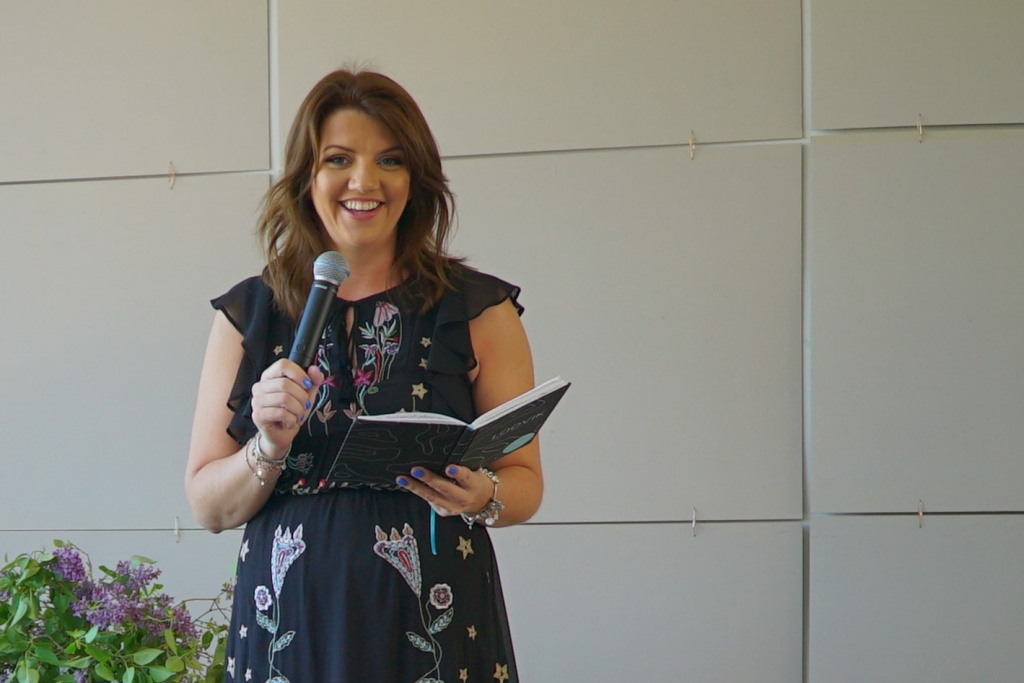
When Sults returned to school in March 2020, right at the chaotic start of the COVID-19 pandemic lockdown period, she started to make a lot of changes in her school’s internal communication. “We mapped parents’ complaints and realised that at least half of them could be avoided with communication,” she explained, adding that they then started giving parents information about different scenarios about a month in advance.
“I really think our internal communication is much clearer now. The school needs to have transparent communication. We use eKool (the Estonian digital school platform) and all the necessary information is there. I don’t think my teachers should communicate with parents via Messenger group chat at nine o’clock in the evening,” she noted. They have also created different tracks so that everyone – students, parents, teachers – can get answers and help as quickly as possible.
Teams build trust and accountability
When Roostik returned from Veriff, they started using Google Calendar and Slack at Tartu Jaan Poska Gymnasium. “All traces are written down and it’s everyone’s responsibility to have the necessary information. The leadership is based on teams and it gives everyone more opportunities to really delve into a certain topic,” she said.

Roostik added that she valued the one-on-one time because it helped her understand how her team members were doing. “What excites them? Where are they on the burnout scale? Obviously, it’s a super energy-intensive process to have all these conversations, but it’s so important! My hands can’t reach every student, but I can reach every teacher,” she explained.
Both Roostik and Sults also cited data-driven decision-making as one of the big changes they have brought to their schools. “We ask the 10th grade students twice a year how they feel, and if there are some dissonances, we have to dig deeper to understand what is behind the results and how to improve the situation,” Roostik said by way of example.
Companies value fresh perspectives
Companies offering internships include Pipedrive, a sales management software company founded in Estonia, and Wise. Both Pipedrive’s people and culture manager, Ingrid Palm, and Wise’s senior people advisor and mentor, Brett Lemsalu, agreed that not only do the companies contribute to the training, but the trainers also bring new value to the company.
“People on the programme are not just observers, they are equal partners with other team members. Depending on their interests and chosen focus, they work closely with different teams and by fulfilling their roles, they bring direct value to us,” Lemsalu explained. She added that educational leaders have always shared their leadership experiences, which broadens the perspective of Wise employees.

“A fresh external view helps us to understand what Pipedrive looks like from the outside, and this is important information for us to improve communication and explain to people outside the sector what we actually do,” said Palm.
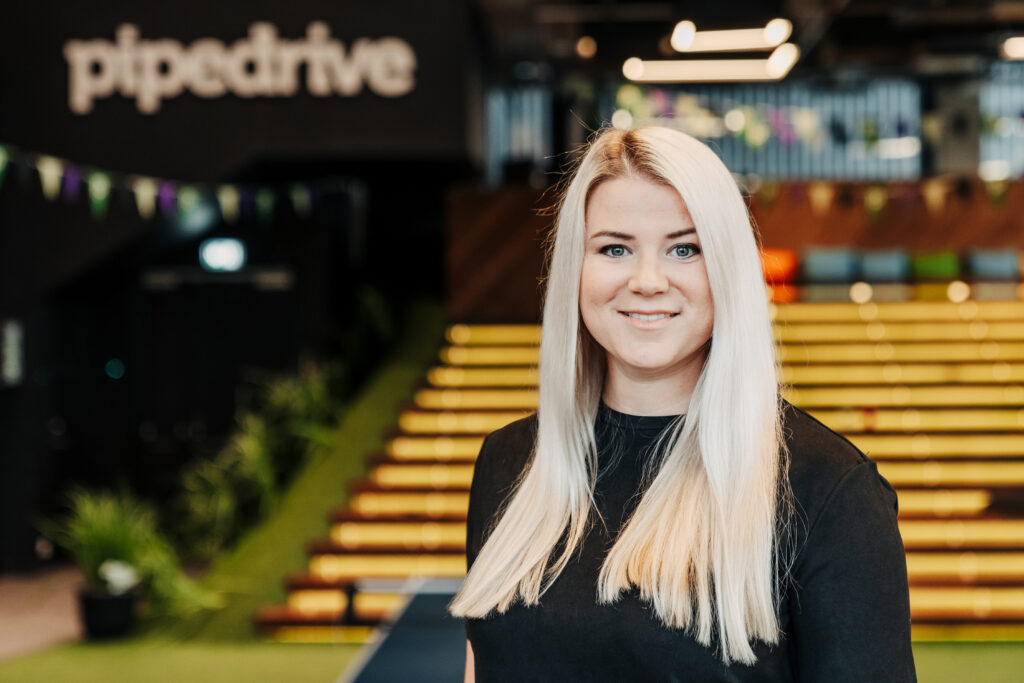
Of course there have been challenges. For example, finding appropriate tasks, making the system understandable to someone from a different background and helping people step out of their comfort zone. Or how to make sure the intern gets what he or she came for?
Lemsalu says they have learned a lot every year since the programme started in 2019, mapping out what works and what doesn’t. “We take that knowledge with us to improve each subsequent placement. In addition to the exciting challenge, it’s a great responsibility because through this connection we have the opportunity to contribute to the development of the school,” she added.

